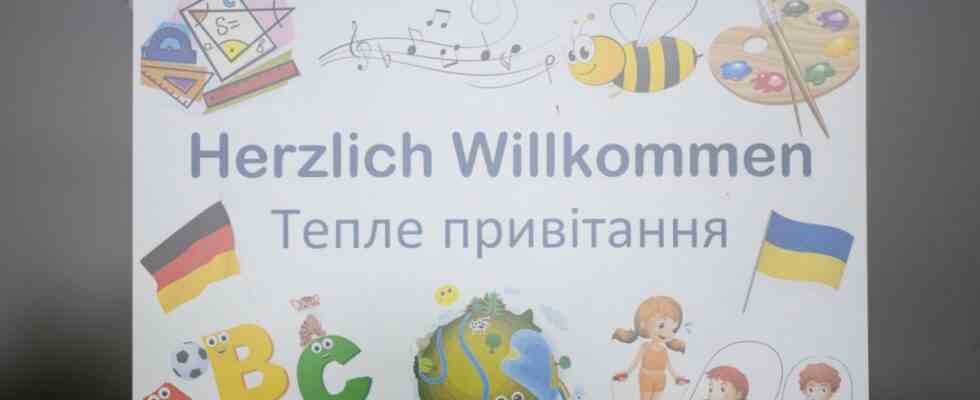If you are in a foreign country and someone speaks your language, you immediately feel safe. A course at the Southeast Adult Education Center comes in handy for people who have taken in Ukrainian refugees. There they can learn the first idioms for everyday communication from Olha Kuzka, a German teacher from the Ukraine. In the interview, the course leader reveals which sentences are helpful and where misunderstandings can arise. The course on May 5th (Haidgraben 9a, room 01, basement, Ottobrunn) starts at 5.30 p.m., participation costs 44 euros. You can register via the adult education center’s homepage at www.vhs-suedost.de.
SZ: Hello, we warmly welcome you to Germany. This is probably the most important thing one should be able to say about refugees from Ukraine. What’s that called in Ukrainian?
The German teacher Olha Kuzka from Ukraine teaches everyday phrases to hosts who have taken in Ukrainian refugees at a course at the Southeast Adult Education Center.
(Photo: private)
Olha Kuzka: Prywit, my rado witajemo tebe w Nimetschyni!
Which idioms should helpers also know that can be helpful in everyday life, and what do they each mean?
I will teach students how to greet each other, how to introduce themselves, and how to inquire about family. “Mene swaty Olha Kuzka” means: “My name is Olha Kuzka”https://www.sueddeutsche.de/muenchen/landkreismuenchen/.”Jak splawy u twojich ridnych w Ukrajini?” means: “How is your family in Ukraine?” I will also talk to the helpers about things like registration and applying for papers. There are often problems here.
You will not only lead the course at the adult education center, but also teach Ukrainian children in a welcome group at the elementary school on Friedenstraße in Ottobrunn and teach German to Ukrainian women at the adult education center. Can you also tell from your experience where there can be communication problems?
Usually there are no problems. I wrote a book about German grammar in Ukraine. I have it with me and use it to learn with the children. The language is not the problem. However, some newly arrived children need psychological help. My German course for Ukrainian women is also progressing well. The women are all very hardworking, they want to work. I am happy that I can help you.
In the course for the German helpers, you will also give insights into Ukrainian culture. What is the most important thing you should know?
We have a lot in common and common words. For example, onion and roof – tsybulya and dakh. A lot of specialties are also the same, for example sausages at the butcher’s, cabbage rolls, various soups. Just like the Germans, we bake something at Easter. I will also tell about Ukrainian traditions and national holidays. What is common among Ukrainians as well as among Germans is a willingness to help that comes from the heart. When I visited my girlfriend in Bavaria, the neighbor came to help mowing the lawn. Neighbors help each other, that’s how it is here in the Ukraine too.
You came to Germany yourself on February 22 to visit your friend. Two days later the war in Ukraine started, they stayed. How are you?
I couldn’t stay with my girlfriend. I now live with my daughter-in-law and my two grandchildren in a house in Ottobrunn. First I came, then my daughter-in-law with the children. You had to jump on a moving train in Poland, it wasn’t easy. My daughter-in-law cried on the phone, I told her: you can do it, you are strong. Now the children go to school in Ottobrunn. We’re satisfied. I’m so glad I don’t have to hear the bombs and rockets. I am so grateful to the Bavarian state for the support.
Giving the refugees support is probably one of the most important things you can do at the moment. So finally: What does Ukrainian mean: Don’t worry, you’re safe here.
Salyshte wsi washi trywoschni Posvhuttja – u nas wy u bespec. My swamy!
The Ukrainian sentences in this text are reproduced in phonetic transcription and not in Cyrillic, since the participants of the VHS course learn the language for oral use.

